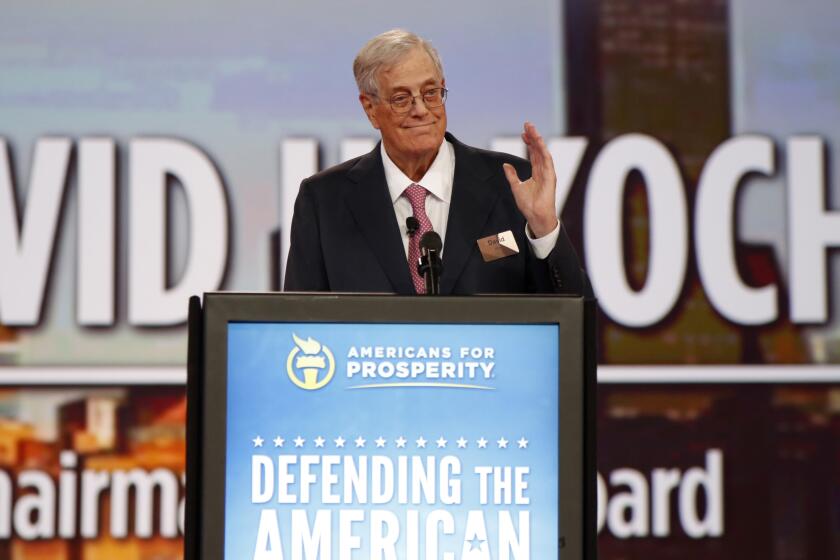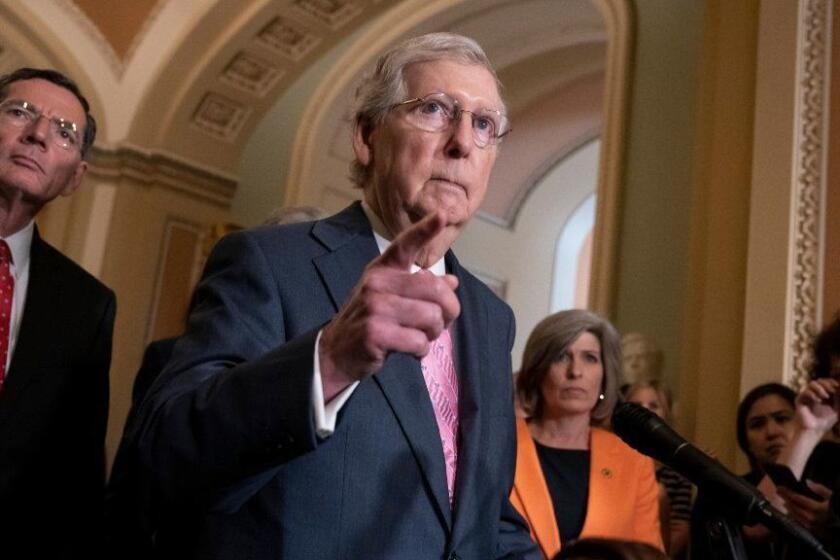Column: The Democrats’ Wall Street wing hates Elizabeth Warren. They hated the New Deal too
- Share via
The least surprising political news in this newsy week may be that the Democrats’ Wall Street donors are so fearful of Elizabeth Warren’s surge to the presidential nomination that they’re threatening to back Donald Trump for reelection.
After all, it’s hardly a shock that the wealthy will go to the mat to protect their fortunes, which Warren has placed squarely in the crosshairs through her advocacy of progressive economic policies, especially a wealth tax.
But the outburst of fear and loathing reported this week by CNBC should remind us that the Democratic Party’s plutocrat wing dates back decades and has always presented a powerful counterweight to its liberal impulses.
There can be only one capital. Washington or Moscow. There can be only one atmosphere of government, the clear, pure, fresh air of free America, or the foul breath of communistic Russia.
— Al Smith attacks the New Deal in 1936
Most notably, the Democrats’ wealthiest supporters were so opposed to the New Deal that they almost ripped the party apart to kill it.
Although they comprised such elite figures as steel and auto executives, heirs to Astor and Du Pont fortunes and Wall Street figures such as James Paul Warburg, they were not above making common cause with the party’s Southern racists to attack Franklin Roosevelt’s policies, which they condemned as “socialism.” (Sound familiar?)
The depth of Wall Street’s animus for Warren isn’t clear. The CNBC article quotes three investment executives but doesn’t identify them by name. CNBC host James Cramer separately has said that he’s heard Wall Street associates expressing the view that “she’s got to be stopped.”
The sentiment has emerged, CNBC says, as Warren has risen in the polls to become the leading candidate for the Democratic nomination for president. Warren has emphasized her reliance on small donors and has pledged not to accept big-money contributions. But she also has described her target not as capitalism but as abuses of capitalist principles. “I believe in markets ― markets that work, markets that have a cop on the beat and have real rules and everybody follows them,” she said earlier this year. “I believe in a level playing field.”
There certainly is precedent for opposition to progressive policies from conservative Democrats. Let’s delve into this history a bit deeper, for the lesson from the New Deal era is that those conservative forces lost the battle.
Roosevelt had tried to mollify the party’s right wing from the moment he took office in March 1933. He appointed as his budget director one of the most conservative Democrats in Congress, Lewis Douglas of Arizona.
While it’s well remembered that FDR launched his first term with a package of progressive banking regulations, it’s generally forgotten that the second bill passed during the famous Hundred Days was the Economy Act, which aimed to cut government spending by 25% and allowed Roosevelt to impose wage cuts on government workers of 15% across the board and even to slash veterans benefits.
This mollified the conservatives, but not for long. As the New Deal continued, pro-business initiatives such as the National Recovery Administration became overshadowed by liberal programs such as the Works Progress Administration and Social Security, along with frequent jawboning to persuade industry to cut worker hours and raise wages.
The business pushback against these pleas bristled with unintended ironies. “Of course I believe in more leisure for workers,” General Motors Chairman Alfred P. Sloan told reporters upon disembarking from the German ocean liner Europa after three weeks’ vacation in the south of France in 1934. “But we should get it by reduced costs and increased efficiency, not by government edict. We should earn our leisure.”
Roosevelt’s policies irritated not only business leaders, but his own cronies among the monied class. There was the Revenue Act of 1935, which supplemented the existing estate tax with an inheritance tax aimed at individual heirs, instituted a new tax on corporate profits tax and made the personal income tax much more progressive at the high end (raising the top rates from 61%-63% on income over $500,000 — about $9 million today — to a graduated rate of 74%-79%).
“Our revenue laws have operated in many ways to the unfair advantage of the few,” FDR said in his accompanying message to Congress. The Revenue Act of 1935 would recognize that “wealth in the modern world does not come merely from individual effort….[T]he people in the mass have inevitably helped to make large fortunes possible.”
The term “socialism” has been enjoying something of a vogue lately, typically used to describe policies that were part of American mainstream politics as recently as the 1980s.
At a lavish White House dinner staged to mollify one of his harshest Democratic critics, William Randolph Hearst, FDR said that to fight communism and “similar crackpot ideas, it may be necessary to throw to the wolves the forty-six men who are reported to have incomes in excess of one million dollars. This can be accomplished through taxation.”
One of those 46, Roosevelt’s crony Vincent Astor, grumbled sheepishly at the dinner that the bill might bankrupt him. FDR’s response, according to another attendee, “seemed to be, ‘Well, that’s just too bad.’”
The climax of the Wall Street Democrats’ campaign against the New Deal was the American Liberty League’s gala dinner in Washington’s elegant Mayflower Hotel in January 1936.
The Liberty League had been formed by a group of wealthy business leaders and old-guard Democrats from the anti-Roosevelt camp, including Sloan, John J. Raskob and the Du Ponts. Its founding principles were: “1. To teach the necessity of respect for the rights of persons and property; 2. To teach the duty of government to encourage and protect individual and group enterprise, to foster ‘the right to work, earn, save and acquire property.’”
A few years ago, the joke going around was that a cocaine habit was God’s way of saying you have too much money.
Franklin Roosevelt’s opinion of the league was withering. “The two particular tenets of this new organization,” he told reporters, “say you shall love God and then forget your neighbor. For people who want to keep themselves free from starvation, keep a roof over their heads, lead decent lives, have proper educational standards, those are the concerns of government besides these two points, and another thing which isn’t mentioned … is the protection of the life and the liberty of the individual against elements in the community that seek to enrich and advance themselves at the expense of their fellow-citizens.”
The Liberty Leaguers already had been seduced by their distaste for the New Deal into investing in the political career of a suspender-snapping Southern bigot, Georgia’s Democratic Gov. Eugene Talmadge.
Talmadge was a reactionary who had come to big business’ notice by promoting such crude anti-labor nostrums as concentration camps for strikers and moving on to attacks on New Deal reforms. The Liberty Leaguers would fund his “Grass Roots Convention of Southern Democrats,” a shadow Democratic convention staged in Macon in 1936.
Deposited on every seat in the hall was a race-baiting magazine clipping depicting Eleanor Roosevelt and members of the administration in the company of black people, along with an editorial praising Andrew Jackson for not allowing “Socialists, Communists, and Negroes to tell him how to run these good old United States.” Broadcast nationally, Talmadge’s openly racist keynote speech ended his national career.
The Mayflower dinner was a different kind of event. Its most glittering ornament was Alfred E. Smith, the Democrats’ 1928 presidential candidate, Franklin Roosevelt’s predecessor as governor of New York, and an increasingly strident critic of the New Deal, whose keynote was to be broadcast nationally.
David Koch leaves a raft of right-wing policies behind him, but his real innovation was creating a dark money network.
Smith had once enjoyed a warm relationship with FDR, whose speech nominating Smith for President at the 1924 Democratic convention had endowed Smith with the nickname of “the happy warrier.” But Smith had been excluded from the Roosevelt administration and nursed the slight relentlessly. FDR’s aides braced themselves for a savage attack on the New Deal. They weren’t disappointed.
Mounting the podium in white tie and tails, Smith urged his listeners to “make a test for yourself ... Just get the platform of the Democratic party and get the platform of the Socialist party and lay them down on your dining-room table, side by side…. After you have done that, make your mind up to pick up the platform that more nearly squares with the record, and you will have your hand on the Socialist platform.”
He said, “There can be only one capital. Washington or Moscow. There can be only one atmosphere of government, the clear, pure, fresh air of free America, or the foul breath of communistic Russia. There can be only one flag, the Stars and Stripes or the flag of the godless Union of the Soviets.”
Smith’s intemperate words stunned his friends and foes alike.
“I just can’t understand it,” FDR said. “Practically all the things we’ve done in the Federal Government are like things Al Smith did as Governor of New York. They’re things he would have done if he had been President of the United States. What in the world is the matter?”
As for the charge of “socialism,” the New Dealers had a ready response. They had unearthed a 1928 speech in which Smith ridiculed the same charge of “socialism” from Herbert Hoover that he now leveled against Roosevelt.
GOP Sen. Joni Ernst wants to ‘reform’ Social Security in secret, an indication that the public won’t like the result
“The cry of socialism has been patented by the powerful interests that desire to put a damper on progressive legislation,” he had said then. “Is that cry of socialism anything new? I have heard it raised by reactionary elements and the Republican party … for over a quarter century.”
Smith’s association with the Democrats’ plutocratic wing turned him into a marginal figure in the party. In 1936 he endorsed the Republican candidate for president, Alf Landon, whose campaign was built upon an attack on Social Security. Landon lost in a landslide, carrying only two states, Vermont and Maine.
As the election demonstrated, voters were so fed up with the economic crisis of the 1930s that they were impervious to the appeals of big business and big money. The Wall Street wing of the party had lost its power to persuade, but it never really went away.
With Elizabeth Warren’s surge, it’s trying to make its voice heard again. But Warren may be tapping into the same discontent with America’s industrial economy that made Franklin Roosevelt impervious to the machinations of the Wall Street Democats of his era. Will history repeat itself?
More to Read
Inside the business of entertainment
The Wide Shot brings you news, analysis and insights on everything from streaming wars to production — and what it all means for the future.
You may occasionally receive promotional content from the Los Angeles Times.














